Universitetsavisen
Nørregade 10
1165 København K
Tlf: 35 32 28 98 (mon-thurs)
E-mail: uni-avis@adm.ku.dk
—
Culture
Molecular gastronomy — The recipient of the 2025 Sonning Prize, French chemist Hervé This, has helped transform our understanding of food. His innovative approach to food preparation bridges scientific disciplines — and he hopes his methods can help prevent future hunger.
»What gives coffee its colour?« The French chemist and recipient of the 2025 Sonning Prize, Hervé This, grins mischievously and points at his cup of espresso.
»Thousands of scientific articles have been written about coffee, yet not one of them describes the chemical processes that occur when coffee beans meet water,« says the Frenchman, emphasising his astonishment with an expressive gesture that seems to involve his whole body.
the SONNING prize
The Sonning Prize is Denmark’s largest cultural award, worth one million kroner. The prize, awarded every second year at the University of Copenhagen, was established by author and editor C. J. Sonning (1879–1937). This year’s prize ceremony took place on 9 April.
The prize is awarded to someone who is »deemed to have carried out commendable work for the benefit of European culture«.
This year’s five prize committee members were Professor Karl Anker Jørgensen, Aarhus University, Professor Marie-Louise B. Nosch, University of Copenhagen, musician Steffen Brandt, artist Erik A. Frandsen, and Birgitte Nauntofte, Chair of the Board at Aarhus University.
The University Post is having coffee with Hervé This at his hotel the day before he is to receive Denmark’s most prestigious cultural award at the University of Copenhagen.
Hervé This is being honoured for his work in molecular gastronomy, now recognised as a legitimate scientific method that examines the chemical building blocks of food, and the processes that transform raw ingredients in terms of shape, texture and flavour during preparation.
Thanks to molecular gastronomy, food is today »part of a broader artistic experience that blurs the boundaries between different art forms«, the award committee writes in its recommendation of Hervé This for the Sonning Prize.
The first foundations of his fame were laid when, at just six years old, he set up his own home laboratory, he explains:
»As a child, I spent all my pocket money on microscopes and other technical instruments, and not a day goes by without me revisiting one of my ongoing research questions,« he says, opening his laptop.
A document overflowing with questions indeed appears, and one of them — still unanswered — concerns the colour of coffee.
»Young students might believe that we old scientists have discovered and examined everything, but there are still plenty of unanswered questions,« the chemist observes.
Hervé This has developed the Note by Note cuisine method, where chefs work with the fundamental chemical components of food — proteins, carbohydrates, fats and acids.
By altering the shape, texture and flavour of ingredients and assembling them into new, unique sensory and taste experiences using tools like centrifuges, dehydrators and rotary evaporators, he has helped fundamentally change our understanding of food. As the award recommendation puts it:
Sometimes you have to go through the king to reach the man on the street and get people to demand what the king is eating
Hervé This
»Instead of using meat, vegetables or grains in their natural forms, Note by Note cuisine means that dishes are constructed from fundamental chemical compounds such as water, lipids, amino acids and carbohydrates, combined with flavours, colours and textures.«
An example of a dish prepared according to the principles of molecular gastronomy could be a soup based on amino acids and fats that simulates the taste and texture of a classic soup, yet contains none of the traditional ingredients like vegetables, stock or meat.
After Associate Professor Jens Risbo from the Department of Food Science had delivered a celebratory speech — Combining love, science and good food — and UCPH rector David Dreyer Lassen had presented the award, Hervé This gave his own lively acceptance speech.
He said that he himself is not particularly good at cooking. He had, however, cracked the code in terms of finding out why a soufflé rises. He joked that he was being awarded the ‘Nobel Prize in soufflé’.
The prize winner acknowledged that the new techniques have mostly gained traction among Michelin-starred chefs, but that his ambitions go far beyond the exclusive group of the wealthy:
»Sometimes you have to go through the king to reach the man on the street and get people to demand what the king is eating,« said Hervé This.
In France, the issue of a higher retirement age can bring thousands out onto the streets in protest — but not the 69-year-old award recipient. He prefers to spend his time in the lab at the AgroParisTech-Inrae International Centre for Molecular and Physical Gastronomy in Paris, or at educational institutions where he passes on his knowledge to younger generations.
He had his international breakthrough with the book Molecular Gastronomy in 2002, and has helped influence Michelin-level chefs across Europe. But right now, his main focus is on the energy crisis and how to prevent future famine.
The global population may rise to ten billion within the next 25 years, but today we can only feed six billion
Hervé This
»I am deeply concerned with food security. The global population may rise to ten billion within the next 25 years, but today we can only feed six billion. The struggle for food could lead to a world war like no other,« Hervé This warns.
»Every day, 10,000 lorries bring food into Paris,« he says, pointing to a photo of a truck on his computer.
»That truck may be carrying several tonnes of tomatoes, but 95 per cent of a tomato is water. What if we removed the water and only had to transport the remaining five per cent?« he asks.
Hervé This is not advocating replacing agriculture with laboratories — something that would undoubtedly send farmers in his home country into an uproar. Farmers should still grow tomatoes and other crops. But through his research he hopes to develop methods that can revolutionise food production so that no one has to go to bed hungry, while also reducing the sector’s energy consumption.
Hervé This is honoured to receive the Sonning Prize, but stresses that he was not alone in developing molecular gastronomy. He especially highlights the late British professor of physics Nicholas Kurti, with whom he collaborated closely in the late 1980s.
»Our scientific approach has helped innovative chefs around the world elevate the dining experience to a new level, where creativity and art meet. It has in this way had a profound impact on modern food culture,« the Frenchman declared in his acceptance speech.
The award ceremony took place in the beautiful ceremonial hall of the University of Copenhagen in front of nearly 200 guests, who afterwards could enjoy samples of dishes prepared according to Hervé This’ principles by the restaurant Alchemist — named the world’s eighth best restaurant in 2024 — and a contributor to Denmark’s status as a gastronomic superpower.
The dishes were extravagant: One was served on a spoon shaped and coloured like an enormous tongue; a water-like liquid, served in an ultra-thin laboratory glass, surprised with an intense smoky flavour; and a petite cake featured an edible image of the award recipient.
When the founder of the Alchemist restaurant, Rasmus Munk, presented the menu of This-inspired titbits, he also said that the new methods would have an impact on a broader audience.
In the healthcare sector, for example, molecular gastronomy is used to enhance the sensory and culinary experience for people with chewing and swallowing difficulties. And on space missions, the method can improve quality of life for travellers — something Rasmus Munk is currently collaborating on with the American space agency NASA.
Back on Earth, the five nominators of the 2025 Sonning Prize point out that Danish vocational training programmes (AMU) and university college programmes have also incorporated molecular gastronomy into their curricula. Evening classes offer courses on the topic, scouts can earn certificates as ‘science pirates’ once they’ve learned about molecular gastronomy, and so on.
Following the award ceremony, students from the University of Copenhagen’s Gastronomic Playroom, Aarhus University and the Technical University of Denmark (DTU) also presented small edible artworks inspired by Hervé This’ principles.


